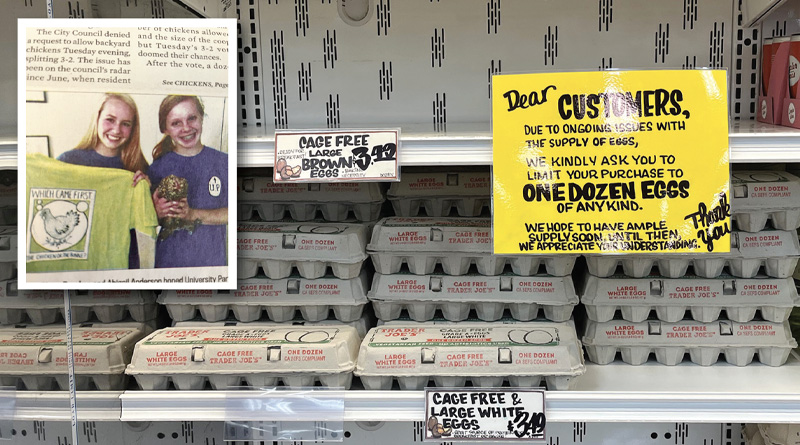Is It Backyard Chicken Time?
With a nationwide egg shortage and prices on the rise, omelet lovers may have started wondering if it’s time to invest in their own backyard flock of chickens.
But chickens won’t fly in the Park Cities. Backyard fowl has been illegal in Highland Park for more than a century. In University Park, chickens were allowed on a case-by-case basis until 2008, when the city updated its ordinances to outlaw the birds.
The UP City Council reconsidered the ban in 2011, but eventually voted 3-2 against legalization. That split decision gave residents, who had even printed “Which Came First, the Chicken or the Bubble?” T-shirts, plenty to squawk about.
Park Cities People entered the fray in a front-page editorial titled “First, They Come for Your Chickens.” We called the right to raise hens a matter of civil liberty and said that the council members who voted against the birds were “stuffy, status-conscious, and out-of-touch” fuddy-duddies.
Although that editorial may have ruffled some feathers, it didn’t change many minds. The legality of chicken ownership apparently hasn’t arisen since.
But even if raising backyard chickens were legal in the Park Cities, would poultry be a sound investment for residents hoping to avoid rising egg prices?
Probably not, said Katy Brank, who lives in Richardson (where chickens are permitted) and has kept a backyard flock for about a decade.
Startup costs are at least $1,000 for a chicken coop and protected chicken run. Brank estimated that she also spends about $60 each month on feed for her seven chickens, which adds up to a lot of eggs. And her chickens don’t lay many eggs if it’s too cold or hot.
Plus, chickens go into “henopause” after several years of egg production and stop laying entirely, so breakfast-lovers would need to replace their birds every other year or so to keep the eggs coming.
That’s not to say that there aren’t other benefits to keeping chickens. I fondly remember my own childhood pet chickens, Pecky, Chirpy, and Eggy, though my stint as a chicken-owner ended early in the interest of neighborhood tranquility when Eggy grew up to be a rooster.
Brank said chickens make fun, educational pets. Her three children have used eggs for science experiments. Her 2-year-old was amazed when he realized that the chicken he played with in the backyard and the one on his plate were the same animal. Some months when her chickens were younger, Brank’s flock laid enough eggs to pay for its feed, but the eggs were a bonus, not a focus.
And no, her family won’t eat “Anna,” “Elsa,” or “Laura Ingalls” once they go through “henopause” and become freeloaders.
“In my view, you’re getting them for pets and some fun science understanding, and understanding the circle of life,” she said. “And not for saving on eggs.”









